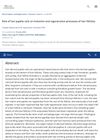Human Fibroblast-Derived Matrix Hydrogel Accelerates Regenerative Wound Remodeling Through Interactions With Macrophages
March 2024
in “
Advanced science
”
human fibroblast-derived matrix extracellular matrix hydrogel FDM-gel collagen hydrogel hair follicle formation β-catenin pro-inflammatory cytokines M2-like macrophages VEGF bFGF integrins α5β1 integrins α1β1 Akt phosphorylation matrix metalloproteinase-9 collagen gel hair follicle beta-catenin vascular endothelial growth factor basic fibroblast growth factor integrins MMP-9

TLDR A new hydrogel made from human cells improves wound healing by working with immune cells to promote repair.
The study demonstrates that Human Fibroblast-Derived Matrix (FDM) hydrogel significantly accelerates wound healing and promotes hair follicle formation by interacting with macrophages. FDM-gel enhances wound closure, dermal regeneration, collagen deposition, and neovascularization while reducing inflammation and myofibroblast presence. Mechanistic studies revealed that macrophage interactions with FDM-gel via integrins α5β1 and α1β1 increase VEGF and bFGF production, crucial for tissue regeneration. Blocking these interactions or depleting macrophages impaired healing, highlighting FDM-gel's potential as an immunomodulatory material for regenerative wound remodeling. In vivo experiments with BALB/c mice confirmed these findings, showing significant improvements in wound healing and regenerative outcomes with FDM-gel treatment.














